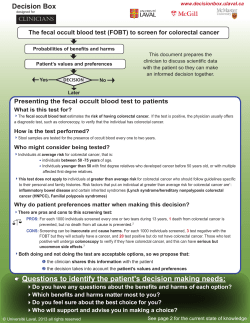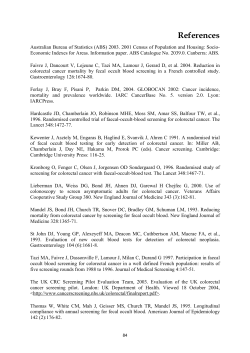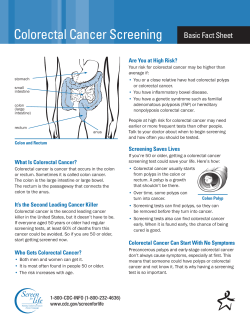
Senator Ben Cardin and Congressman Richard Neal Introduce
FOR IMMEDIATE RELEASE Contact: Jacqueline Gaulin 301-263-9000 or mediaonly@gi.org Senator Ben Cardin and Congressman Richard Neal Introduce SCREEN Act Bill Reduces Barriers for Medicare Beneficiaries to Colorectal Cancer and Hepatitis C Screening Bethesda, MD (April 28, 2015) – U.S. Senator Ben Cardin (D-MD) and Representative Richard Neal (D-MA) introduced the “Supporting ColoRectal Examination and Education Now (SCREEN) Act” (S. 1079/H.R. 2035), which eliminates barriers to potentially lifesaving colorectal screenings for Medicare beneficiaries and ensures they are screened regularly through a variety of recommended methods, including colonoscopy. Both Senator Cardin and Congressman Neal have long advocated for increasing colorectal cancer screening in Medicare. Mr. Cardin has introduced iterations of the SCREEN Act in each Congress since 2002, first as a member in the U.S. House of Representatives. Colorectal cancer is the second leading cause of cancer death in the United States, with approximately 50,000 Americans expected to die from colorectal cancer this year alone. While this country is making progress against colorectal cancer mortality, more needs to be done to increase the use of screening tests by Medicare beneficiaries. The American College of Gastroenterology and over 200 private and public sector partners, including the American Cancer Society, are committed to an ambitious public health goal of screening 80 percent of eligible adults for colorectal cancer by 2018. The Medicare-age population, which is at the greatest risk for developing colorectal cancer, has screening rates far below this 80% target – only 64% according to the American Cancer Society’s “Colorectal Cancer Fact & Figures 2014-2016.” Medicare beneficiaries also account for two-thirds of all new cases of colorectal cancer each year, according to the U.S. Centers for Disease Control (CDC). “The American College of Gastroenterology is deeply concerned that Medicare beneficiaries who should be screened for colorectal cancer as part of covered preventive benefits are not getting these recommended tests because they face significant obstacles,” said Stephen B. Hanauer, MD, FACG, President of the American College of Gastroenterology. “The SCREEN Act not only removes financial, structural and educational barriers to colorectal cancer screening for Medicare beneficiaries, but also allows for Hepatitis C screening at the time of colorectal screening, as appropriate.” About the SCREEN ACT: Financial Barriers to Colorectal Screening Removed Medicare currently waives cost-sharing by beneficiaries for any colorectal cancer screening test recommended by the United States Preventive Services Task Force (USPSTF). However, if a polyp is removed during the screening colonoscopy, the procedure is no longer considered a “screening” for Medicare purposes, and costsharing applies. The SCREEN Act waives cost-sharing when a polyp is removed during a screening colonoscopy. The proposed legislation also waives cost-sharing under Medicare for required follow-up colonoscopy subsequent to other recommended USPSTF recommended colorectal cancer screening tests. This removes all financial barriers for Medicare beneficiaries throughout the screening continuum, so that cost-sharing would not apply whether the colonoscopy was a preventive test or as the result of a positive finding from another screening modality. – more – Not only does the SCREEN act address barriers to colorectal screening for Medicare beneficiaries, but it also creates incentives to ensure that these patients receive the highest quality exams. The SCREEN Act implements a three-year freeze in colonoscopy reimbursement for those providers who participate in nationally recognized quality improvement registries. This will encourage quality benchmarking and drive ongoing improvements to care at a time when Medicare reimbursement for these lifesaving exams remains under significant pressure. “The legislation helps reform the Medicare reimbursement system by helping to ensure providers are paid for the quality of the services as opposed to the quantity of the services,” said Caroll D. Koscheski, MD, FACG, Chair of the ACG National Affairs Committee. New Demonstration Project Links Colorectal Cancer Screening to Discussion and Testing for Hepatitis C Virus The SCREEN Act establishes an innovative Medicare demonstration project which allows for an office visit to discuss colonoscopy preparation and patient questions. This pre-screening visit would also serve as an opportunity for Medicare beneficiaries to discuss Hepatitis C screening with their provider. Offering age appropriate Hepatitis C screening at the same time as colonoscopy meets two important public health imperatives in the same encounter. The SCREEN Act makes this even easier by providing an alternative pathway to comply with Medicare’s referral requirement prior to Hepatitis C screening. Recent findings from a small study in Texas at Scott & White Hospital demonstrate that more patients will elect to undergo a Hepatitis C screening test if it is offered by a gastroenterologist at the same time that the patient schedules a screening colonoscopy. (Sears, et al. “Birth Cohort Screening for Chronic Hepatitis During Colonoscopy Appointments,” Am J Gastroenterol 2013; 108:981–989) About Hepatitis C The CDC recommends one-time Hepatitis C screening for “Baby Boomers” in the 1945 to 1965 birth cohort who make up approximately 30 percent of the United States population and account for two-thirds of those infected with Hepatitis C in this country. Yet roughly 85 to 90 percent of those with chronic viral Hepatitis C are asymptomatic, meaning they have no outward signs of disease, according to CMS, and many are unaware of that they are infected. About Colorectal Cancer Colorectal cancer is highly preventable with appropriate screening. According to an important 2012 study published in the New England Journal of Medicine, with colonoscopy and removal of polyps, mortality from colorectal cancer may be reduced by 53 percent. (Zauber et al. N Engl J Med 2012; 366:687-696) About Colonoscopy Colonoscopy is a unique preventive service because pre-cancerous polyps can be visualized and removed during the same encounter, preventing potential cancers from developing. The U.S. Preventive Services Task Force (USPSTF) provides an “A” rating for colorectal cancer screenings such as colonoscopy. According to the 2009 ACG Colorectal Cancer Screening Guidelines, colonoscopy is the “preferred colorectal cancer prevention strategy.” About the American College of Gastroenterology Founded in 1932, the American College of Gastroenterology (ACG) is an organization with an international membership of more than 12,000 individuals from 80 countries. The College's vision is to be the preeminent professional organization that champions the evolving needs of clinicians in the delivery of high quality, evidence-based, and compassionate health care to gastroenterology patients. The mission of the College is to advance world-class care for patients with gastrointestinal disorders through excellence, innovation and advocacy in the areas of scientific investigation, education, prevention and treatment. www.gi.org ###
© Copyright 2025









